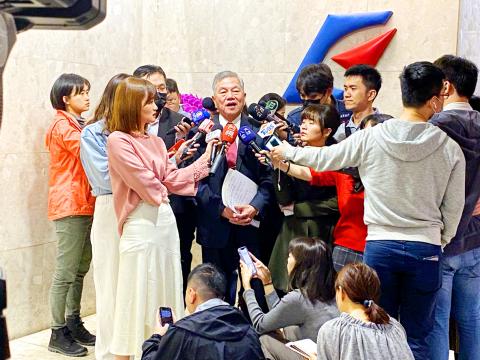The Ministry of Economic Affairs is to assist companies in traditional manufacturing sectors cope with raw material shortages amid the COVID-19 pandemic, Minister of Economic Affairs Shen Jong-chin (沈榮津) said yesterday.
“While the current effects are still limited ... some of our local manufacturers may soon run low on [raw materials],” Shen told reporters after a meeting with manufacturing industry representatives, pointing to recent supply chain disruptions across China, where production was suspended last month and January due to the outbreak.
Encompassing most of the secondary sector of Taiwan’s economy, traditional industries — such as food processing, pharmaceuticals, textile, petrochemicals, glass and cement — produce essentials used in housing, dining, clothing and healthcare.

Photo: Huang Pei-chun, Taipei Times
The combined output value of companies in these industries is estimated at NT$5.4 trillion (US$178.75 billion) a year, ministry data show.
The ministry would help accelerate inspections for faster raw materials imports, Shen said.
“Now it’s a question of speed... it [imports and exports] must be quicker,” he said, adding that the nation’s food supply remains stable.
Local manufacturers have also asked the government to loosen regulations on employee working hours, Shen said.
Meanwhile, businesses are raising fears over a potential credit crunch, he said.
Those fears are far from unfounded as a recent drop in crude oil prices sent shock waves across global markets.
Markets from the US to Europe, which have seen a surge in COVID-19 cases, on Thursday experienced one of the greatest declines in decades.
Shen said that “the drop in oil prices should relieve some of the burden [on domestic demand],” but added that high volatility in US and European markets would affect global demand, which needs to be “closely observed.”
In other news, the ministry yesterday said it approved the applications of seven small and medium-sized enterprises to participate in a government plan aimed at stimulating investments in the nation.
The following companies, specializing in plastic recycling, metal components and machinery equipment, are combined to invest more than NT$3.8 billion to expand domestic production: Young Iee Environmental Technology Co Ltd (永溢環保), Jenn Lih Machinery Manufacturing Corp (震勵機械), Fu Lung Aluminum Technology Ltd (福隆鋁業), Long Tai Copper Corp (隴鈦銅器), Sheng-Hsin Machine Industry Co Ltd (勝新機械), Lee Dan Electronic Technology Co Ltd (利電電機) and Gus Technology Co Ltd (格斯科技).
The ministry has to date approved applications from 169 companies seeking to invest a total of NT$78.4 billion as part of the plan.

The demise of the coal industry left the US’ Appalachian region in tatters, with lost jobs, spoiled water and countless kilometers of abandoned underground mines. Now entrepreneurs are eyeing the rural region with ambitious visions to rebuild its economy by converting old mines into solar power systems and data centers that could help fuel the increasing power demands of the artificial intelligence (AI) boom. One such project is underway by a non-profit team calling itself Energy DELTA (Discovery, Education, Learning and Technology Accelerator) Lab, which is looking to develop energy sources on about 26,305 hectares of old coal land in

Taiwan’s exports soared 56 percent year-on-year to an all-time high of US$64.05 billion last month, propelled by surging global demand for artificial intelligence (AI), high-performance computing and cloud service infrastructure, the Ministry of Finance said yesterday. Department of Statistics Director-General Beatrice Tsai (蔡美娜) called the figure an unexpected upside surprise, citing a wave of technology orders from overseas customers alongside the usual year-end shopping season for technology products. Growth is likely to remain strong this month, she said, projecting a 40 percent to 45 percent expansion on an annual basis. The outperformance could prompt the Directorate-General of Budget, Accounting and

Netflix on Friday faced fierce criticism over its blockbuster deal to acquire Warner Bros Discovery. The streaming giant is already viewed as a pariah in some Hollywood circles, largely due to its reluctance to release content in theaters and its disruption of traditional industry practices. As Netflix emerged as the likely winning bidder for Warner Bros — the studio behind Casablanca, the Harry Potter movies and Friends — Hollywood’s elite launched an aggressive campaign against the acquisition. Titanic director James Cameron called the buyout a “disaster,” while a group of prominent producers are lobbying US Congress to oppose the deal,

Two Chinese chipmakers are attracting strong retail investor demand, buoyed by industry peer Moore Threads Technology Co’s (摩爾線程) stellar debut. The retail portion of MetaX Integrated Circuits (Shanghai) Co’s (上海沐曦) upcoming initial public offering (IPO) was 2,986 times oversubscribed on Friday, according to a filing. Meanwhile, Beijing Onmicro Electronics Co (北京昂瑞微), which makes radio frequency chips, was 2,899 times oversubscribed on Friday, its filing showed. The bids coincided with Moore Threads’ trading debut, which surged 425 percent on Friday after raising 8 billion yuan (US$1.13 billion) on bets that the company could emerge as a viable local competitor to Nvidia